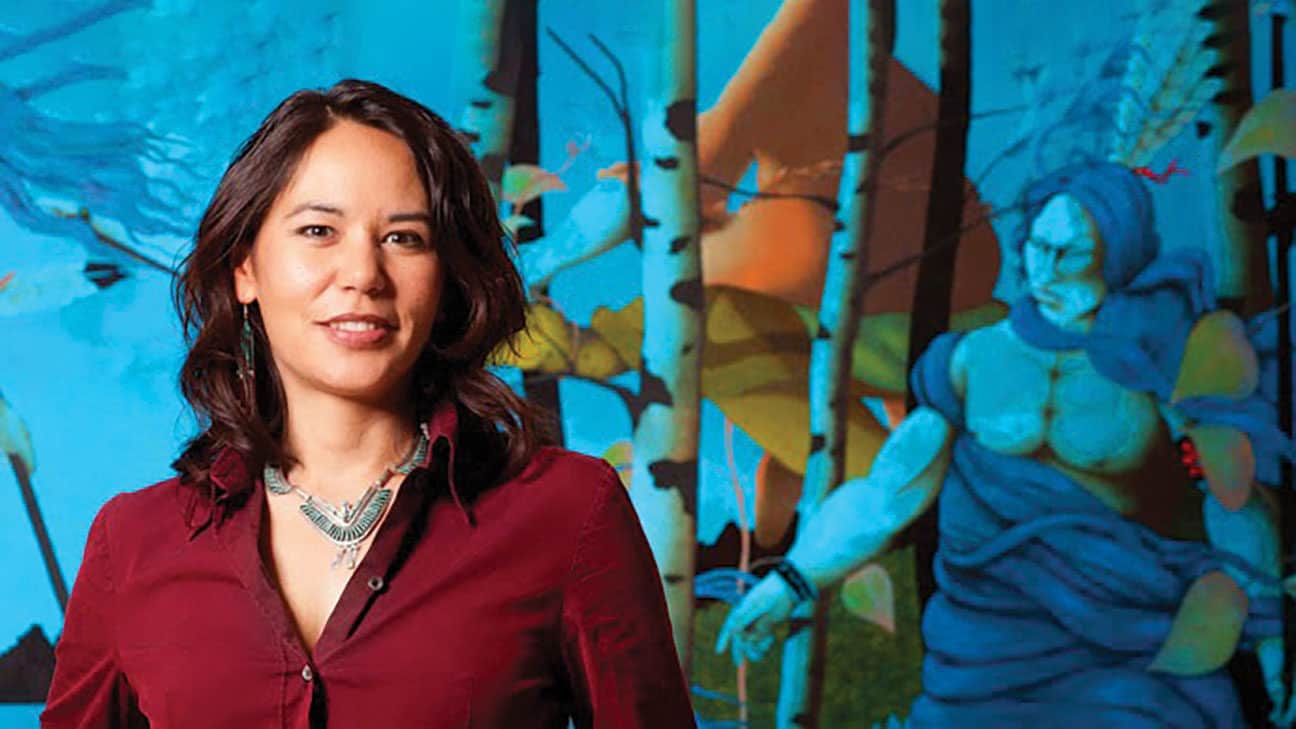
Dr. Johnson-Jennings has worked with Indigenous nations across the globe to fight addiction.
Johnson-Jennings gives back to community
Published February 1, 2022By Chris Jennings
Dr. Michelle Johnson-Jennings has always dreamed of giving back to her community. She talked about that dream in her high school journal.
“I wrote in that journal, back in high school, that my dream was to work with my community. To help revitalize our ancestors’ stories and our practices and our love; to help and give in some way,” said Johnson-Jennings.
Johnson-Jennings has completed that goal on a global scale. She’s worked with international and national Indigenous nations, organizations, and communities to prevent substance abuse, food addiction and obesity. She also co-developed health interventions using ancestral guidelines to encourage a renewed commitment to health and revitalize medicine, food and land-based practices.
From working at Saskatchewan University in Canada to completing a Fulbright Scholarship in New Zealand, her career path has taken her far from home. Regardless of where she’s located, that goal of teaching and enabling her Native community is still being accomplished.
Most recently, she’s joined the School of Social Work as professor and director of the division of environmentally-based health and land-based healing at the School’s Indigenous Wellness Research Institute in Seattle, Washington.
Johnson-Jennings teaches community health leaders techniques and practices that they can then take back to their communities. These leaders are then equipped with the knowledge necessary to improve not just their own lives but the lives of others.
One of the things Johnson-Jennings has worked on closer to home is as being part of the team to start the Yapalli project. The Yapalli project takes a group of women and prepares them to walk on the Trail of Tears. While on the walk, which takes several days, stories of ancestors from specific spots on the trail are shared with the women.
“We read the actual words of the ancestors from those locations that we visit on the trail. Every time, those ancestors talk about love,” said Johnson-Jennings.
In land-based healing, you go back to sites of trauma and reconnect with what your ancestors were going through. These stories of love, when told at sites of trauma, affect the participants in ways that can help them fix their own lives.
“As we go back to the land, what we find is that individuals are better able to think about trauma and how to fix their life, to reconnect to Mother Earth,” said Johnson-Jennings.
By visiting these sites of trauma, participants are confronted with the sadness and grief that their ancestors experienced. They’re also faced with their ancestors’ love for future generations, which gave them the strength to get through the hardships. Being able to experience this instills a sense of responsibility.
“We face that sadness and grief, but we also heal through reconnecting to the land, to the sites of trauma… and focusing on our ancestors’ strength of love for the future generations,” said Johnson-Jennings.
It’s this cosmic pay-it-forward that can be the heart of healing for generations to come. The realization that your ancestors loved you before you were born, that they survived these hardships so that you could have a better life.
By accepting their gift of a better life, you’re also ensuring the possibility of a better life for generations to come. Johnson-Jennings reiterates this, asking, “What can we do right now to make a better life for future generations?”
Before joining the University of Washington, Johnson-Jennings was an associate professor in community health and epidemiology in medicine and associate professor in Indigenous studies and the scientific director of the National Indigenous HIV/AIDS Centre at the University of Saskatchewan. She held the Canadian Research Chair in Indigenous Community-Engaged Research.
She founded and directed the Research for Indigenous Community Health Center at the University of Minnesota and conducted research in New Zealand as part of a U.S. Fulbright scholarship.
Johnson-Jennings received her doctoral degree in counseling psychology from the University of Wisconsin-Madison and a master’s degree in education from Harvard University, where she specialized in human development and psychology and contemporary Native issues.